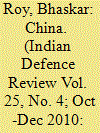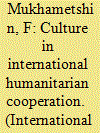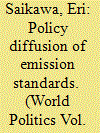| Srl | Item |
| 1 |
ID:
100240


|
|
|
| 2 |
ID:
100324


|
|
|
|
|
| Publication |
2010.
|
| Summary/Abstract |
THE NEW CHALLENGES at the start of the new century and the challenging tasks in the realm of international relations in conditions of globalization make Russia's cultural ties increasingly important. Clearly global competition is getting a culture-and-civilization dimension. Globalization processes entail more than interpenetrating and mutually enriching cultures, and they also often endanger the cultural uniqueness of some countries and peoples. The threat of fault lines developing between civilizations calls for collective efforts to start cultural dialogues. Of ever greater importance in this context is to preserve cultural heritage and make greater use of cultural resources in the foreign policy arena.
When he addressed a conference of Russia's ambassadors and permanent representatives to international organizations, President Dmitry Medvedev stressed that "with all the sharp differences in the world arena, there is a clear desire to harmonize relations, establish dialogue and reduce conflicts."1 We should note in this connection that humanitarian cooperation is one of the most effective means to establish dialogue between civilizations, reach accord and understanding among nations, and to end confrontation in the world. It is culture and humanitarian aspects that are increasingly influencing, in the final analysis, the shaping of a modern-day multi-center system of global management and giving it a sense of direction.
|
|
|
|
|
|
|
|
|
|
|
|
|
|
|
|
| 3 |
ID:
159495


|
|
|
|
|
| Summary/Abstract |
We show that support for the Leave option in the Brexit referendum was systematically higher in regions hit harder by economic globalization. We focus on the shock of surging imports from China over the past three decades as a structural driver of divergence in economic performance across U.K. regions. An IV approach supports a causal interpretation of our finding. We claim that the effect is driven by the displacement determined by globalization in the absence of effective compensation of its losers. Neither overall stocks nor inflows of immigrants in a region are associated with higher support for the Leave option. A positive association only emerges when focusing on immigrants from EU accession countries. The analysis of individual data suggests that voters respond to the import shock in a sociotropic way, as individuals tend to react to the general economic situation of their region, regardless of their specific condition.
|
|
|
|
|
|
|
|
|
|
|
|
|
|
|
|
| 4 |
ID:
138415


|
|
|
|
|
| Summary/Abstract |
Recent years have seen the emergence of an international market for higher education. It is likely that the number of international students worldwide may have reached 5.2 million in 2014, with these students responsible for expenditures for tuition, accommodation, and other living expenses of no less than $50 billion. Since 1970, the number of international students is estimated to have doubled every fifteen years, on average, and the pace may be accelerating because of the expanding pool of tertiary education graduates in emerging economies where more education suppliers are entering the market. Experts predict that there will be at least 8 million international students by market. 2025, a larger group than the total population of Switzerland, Norway, or Ireland. This article traces the growth of student migration to the Cold War period when it was driven largely by the competition between the Soviet bloc and the West for influence in the developing world, how it has since been transformed (and now is being driven mainly by competition for dominance in technological innovation and trade), and concludes with questions on what it means for the less-developed countries of origin.
|
|
|
|
|
|
|
|
|
|
|
|
|
|
|
|
| 5 |
ID:
119685


|
|
|
|
|
| Publication |
2013.
|
| Summary/Abstract |
In a dramatic example of policy diffusion, the past three decades have witnessed the spread of automobile emission standards throughout the world. Contrary to fears that global competition would produce a race to the bottom, there appears to be a race to the top, not only among rich countries but also among poor ones. Using econometric analysis of the adoption of automobile emission standards over the past twenty years for 129 countries, the author argues that this global diffusion results from countries' efforts to stay competitive in the international market. Due to the pressure from importing countries that have adopted stringent emission standards, even developing countries have rapidly moved to adopt rich country standards. The evidence shows that adoption of automobile emission standards correlates with an increase in the total value of automobile exports. Under some conditions, economic incentives in a global market can be a complement to environmental protection.
|
|
|
|
|
|
|
|
|
|
|
|
|
|
|
|
| 6 |
ID:
147038


|
|
|
|
|
| Summary/Abstract |
In early May, a week apart, Russia's Minister of Agriculture Alexander Tkachev and presidential economic advisor Sergei Glazyev spoke of exporting Russian fresh water. The minister came out with a radical proposal to export surplus water from hydroelectric power plants in the Altai region to Chinas Xinjiang via Kazakhstan. Glazyev took a more market-oriented approach. He proposed "collecting, purifying, treating and exporting fresh water." In former years, Moscow's ex-mayor Yuri Luzhkov also proposed exporting Russia's water resources, and in 2013 the Economic Development Ministry considered the idea, too. Now this idea has emerged in a different context, but its essence is the same--to get a lot of money without making much effort by selling natural resources that cost nothing to the country.
|
|
|
|
|
|
|
|
|
|
|
|
|
|
|
|